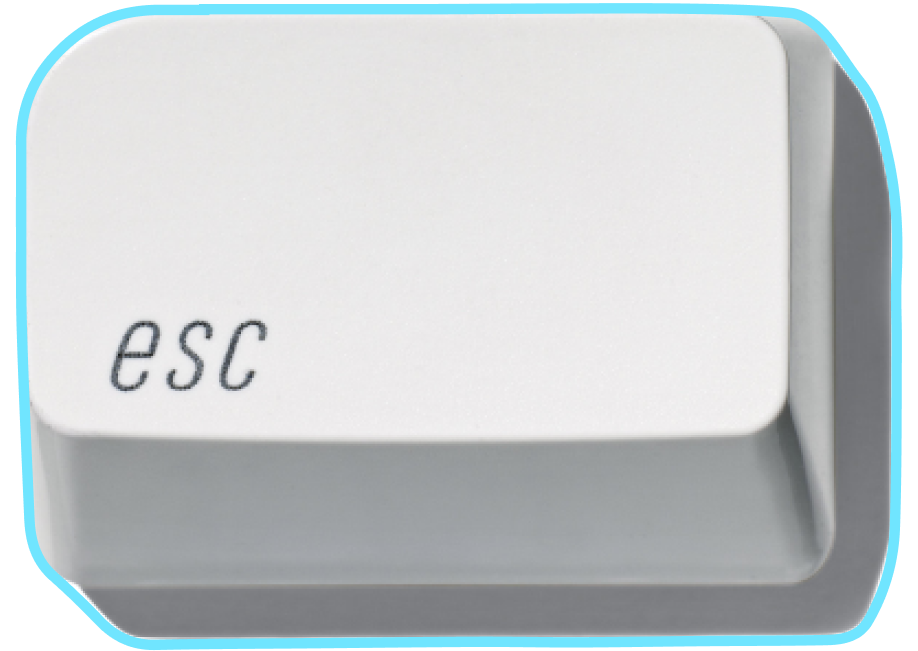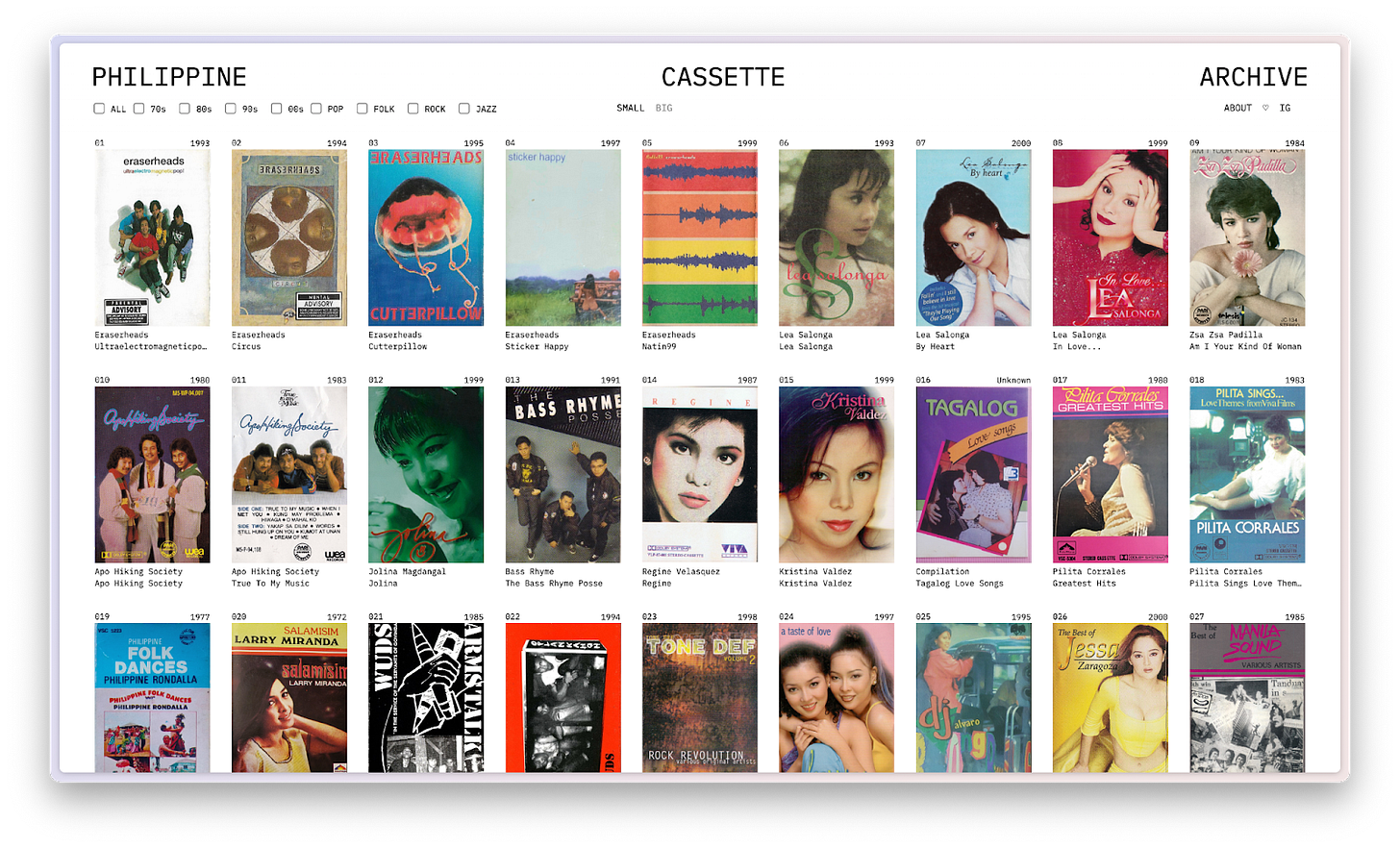The web is a place where people gathered
A conversation with Chia Amisola (part 2)
Chia Amisola is a Phillipines-born internet and ambient artist / designer whose work surrounds the making of creative tooling, spaces, and communities, especially on the web. Part I of our conversation addressed the theme of love in their work; Part II addresses the theme of archival.
It’s clear that you’re very obsessed with archiving your own work, to the extent that in researching the things you’ve done I had the sense of being caught in a web of projects and platforms that all catalog each other, many claiming to be the main source of truth. Is there a fear that underlies this project of self archival?
I've been making sites from a very young age, as early as seven years old. I like collecting this vast span of artifacts together because I don't just see it as the making of an output, but as a process of documenting my interests and how I navigated myself at various points in time. The making of these sites is a making of the self. I'm immigrating to the US and I'm physically distant from where I was born and raised in the Philippines. When I look back, I realize that these are the closest surviving records I have of myself. My only memory of seven year old Chia is in the website I left of myself.
It's definitely an imprecise method of archival, but the fragmentation is exactly what makes it feel true to me. Each archive represents a different way of looking inwards, in the way that any medium of documentation asserts a different view, through the quality of the medium, the form, the structure, and the reliability of the links. So they become different caves and labyrinths of knowing me.
I try to be intentional about how much I reveal at each entry point. Some of my links are buried deep within an old blog post. I have the mentality of entrusting that whoever is willing to do the work to unearth them has the right to know me in that particular way. One site asks, “if you knew me would you love me?” and another responds, “know me until we can't help but love.”
Recently I've been thinking a lot about how meaningful ritual requires sacrifice. So meaning can be created through having to sacrifice time and effort to find something online the way that you're describing. If you've done the work to try to get to know me, then that's what makes it okay for you to know me.
Anyone who goes through the effort to know you is someone who loves you wholly. And I think there's no better definition of love than that all-enveloping, that knowing, that acceptance, that willingness to dive deeper into someone. That rings especially true today in the context of our capsized attention.
I’ve only just been able to name the fact that when I abandon a web project that I’ve made, it's not a failure of presenting myself; it's just a continuation of showing myself.
Ritual is used a lot of the time to recognize moments of transformation, like a birth, or a child becoming an adult. So setting aside an old website and making a new one becomes a way to recognize a transformation in yourself.
I was born Catholic in the Philippines, the only Catholic-majority nation in all of Asia. And when you're observing extant ritual, it's hard to know what you can make for yourself. I lived a life where a very linear path was expected of me, where I was expected to fit in certain binaries, where acceptance meant conformity into many repetitive patterns and rituals. The literal ceremonious religious rituals were built atop of transformation, but you could only transform to this expected self.
In a way, the only surviving record of myself became this ritual of web making that I didn't even know I was participating in when I was a young kid. I continuously practiced it until it became a part of me. I didn't know it at the time, but technology was my religion, too. It just felt like magic: I had full agency over my environment, completely unlike my outer world. So I was unknowingly beginning this process of self-discovery, which later made me believe in this technology’s potential.

How would you describe your relationship with the Algorithm?
It's always been a battle. When I started Developh, the nonprofit I run in the Philippines that is a community for political technologists, I'd host all these events and workshops. Some of the greatest people I've met, many of whom are my close friends today, who have seen each other go through high school and college and our early careers, I literally met through the whims of the Algorithm.
But as I've been developing a more personal artistic practice, and actually sharing my name, it's become more complicated, because there's less distance between me and the work that I produce. It’s hard to prevent myself from doing the misattribution of thinking that how I am delivered by this Algorithm is how others are really receiving me. So I'm doing as much as I can to plant these seeds to get people to connect with me in a deeper sense. It's an exploratory tool, but not what we should use to know all of each other. It's something I resent the Algorithm for, but not people. It's something I wish that we had better alternatives to.
Can you think of any projects that you've done that you personally love, but did not “succeed” in the market of online attention?
There's a bunch of smaller indexes and archives that I’m working on that don’t get as much attention. I call this work the making of “folk archives.” One I’m passionate about is the Philippine Cassette Archive, wherein I collect tapes distributed by Filipino labels between the 70’s and 90’s. Another archive I’m working on is a collection of Philippine sari-sari stores, which is our equivalent of a bodega: informal stores that people put on the ground floor of their homes where you sell bits of candy and home goods. They’re everywhere; every block has at least two.
Much of Philippine culture is so sparsely documented and stuck in photo albums or physical markets. It’s incredibly laborious to collect, aggregate, scan, or trace the provenance of these histories and lived experiences. But in the Philippines, there’s a huge culture of collecting. It’s a very maximalist culture in which for lots of the lower-middle class, the accumulation of goods acts as a sign of wealth and knowledge. This is my way of legitimizing and extending these practices beyond walled homes: opening up this practice of collecting so that more people can gather around them.
It's kind of a niche thing (it definitely lacks formal institutional support within the nation), which is why it doesn’t get a lot of algorithmic attention — but oftentimes, these folk archives are really made for very specific audiences. They're hyperlocal in a sense. I would love for my friends and families who keep precarious collections of Philippine coins and other documents, or have photo albums of specific moments in history that are never recorded by the government, or were in a context that lacked the cultural institutions to be properly archived, to be able to take charge of their histories through websites or even literal flash drives.
I recently hosted a workshop on making spreadsheet-based websites, which to me is a low-barrier way to start thinking about memory, data, and maintenance. I'd love to see an abundant amount of handmade archives made for small, personal and intimate collections.
The history of the internet is increasingly becoming the history of people. And it's scary to me that it falters on a personal scale. We have the tools to witness one another, deem ourselves worthy of saving, and to save each other.
What would an internet look like that valued this kind of work more highly? Or more generally, in your ideal world, what does the future of the internet look like?
The ideal internet would be one that values maintenance, and the labor of maintenance. In a culture in which people and the Algorithm continuously reward the making of new things, it’s such a radical and inward act to continue the work of preserving the systems and institutions that have long been before you. Many of the problems ‘new things’ attempt to solve are age-old.
My interest in web archives is not siloed. It comes from a long history of archival practices that I am inspired by and work to respect. Many of my issues with design are that technological solutions often compromise the history of the mediums and institutions that had come before them. We must move towards an internet that makes easier and more legible the process of carrying something through time. Building things for smaller audiences and resisting expansionism—the constant need to scale—and beginning with smaller, intimate groups of people truly helps. It’s in specific, smaller scale communities that we get people to care for things deeply, truly feel connected with their technologies and communities, and subsequently put in the effort to invest in these spaces and put in the labor of maintenance. Maintenance doesn’t need to be a huge undertaking — it’s a small, incremental, loving, continuous practice that we should engage in each and every day.

There are, I think, two ways of thinking of archival: one as a way of keeping a physical thing for as long as possible, and one as propagating a practice. If I have a loaf of bread, I can “archive” it by preserving it in amber, or I can teach my children how to feed the sourdough starter that made the bread. And hopefully, they’ll teach their children to do the same and the starter will multiply and maybe change a bit over time and will be preserved through the performance of feeding both starter and people.
That reminds me of rituals again. What is the bread or the website as an artifact or a screenshot in the Wayback Machine alone? A website is not that. It’s not just a package of code, it’s a place where people gathered, it’s a place that was referenced by a network of other sites before its links rotted away. It was once a place where there was life. And when we pass down the ritual of gathering, that's a truer form of preserving. We can't expect for a piece of bread or the site to last forever. But the act of feeding and living onwards will continue to be the most important thing about it.
So my great vision is to be able to see the internet as a place where I can gather all the people I love. And my extended vision is for the people I love to also be able to see the internet as a place where they can gather the people they love. And for this practice to extend and radiate outwards, and reach as many people as possible. By presenting the infrastructure and labor, I show that a website is an act of love and an act of asking to be loved.
What are you thinking about nowadays? What's next for you?
Personally: I'm working on When We Love, a project about digital intimacy and love online.
Communally, Developh (my nonprofit) initiated the Philippine Internet Archive at the start of the year. I've been profiling hundreds of Filipino internet/networking pioneers, making small tools, and hosting workshops on folk archival methods to support this work — it's an ambitious, lifelong endeavor.
Both efforts ultimately deal with preservation as survival: extending my practices of self-preservation in my modes of loving and being on the web to work towards communal, national preservation. When you make space for yourself, others step in.









